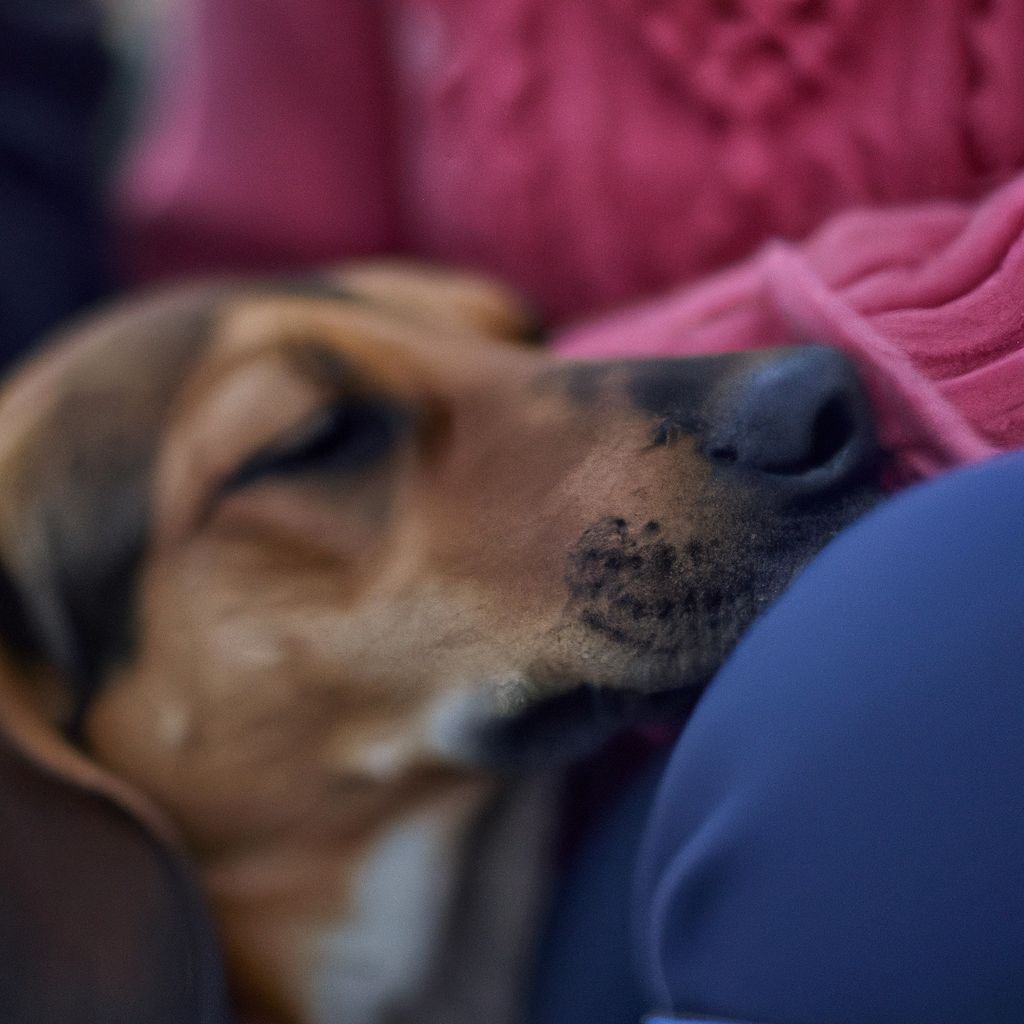Key takeaway:
- Dogs bury their nose in their owners as a way of seeking comfort and strengthening the bond between them.
- Possible reasons for this behavior include a desire for security, displaying affection and trust, or seeking attention from their owners.
- To ensure safety and prevent any discomfort, it is important to set boundaries and teach proper behavior, such as not allowing the dog to bury their nose excessively or in potentially harmful situations.
Why do dogs bury their nose in their owners?


Canines bury their noses in their humans to show affection and seek comfort. It's a natural instinct stemming from years of domestication. This behavior is a sign of trust and closeness. Dogs have an acute sense of smell; so, the scent of their owners provides them with security. Also, it could be a way for dogs to get info about their surroundings.
Moreover, this could be seen as a display of submission and respect. By burying their noses in their owners, dogs are showing deference to the more dominant pack member. It's essential for owners to respond positively by providing gentle affection and reassurance.
Not all dogs do this equally. Breeds like Chihuahuas or Yorkshire Terriers may have a stronger inclination compared to Great Danes or Retrievers. Canines Magazine emphasizes the importance of recognizing and accommodating a dog's burrowing behavior for their overall well-being. After all, dogs just want to say ‘Hey, I love you, but can you pass the snacks?'
Possible reasons for the behavior
Dogs burying their noses in their owners can be for various reasons. It could be a sign of affection, seeking attention, submission, or comfort. It could also be that dogs have a great sense of smell and are trying to learn more about their surroundings. Alternatively, they could be marking their owners with their scent as a way to bond and protect their territory. Lastly, each dog is different, so their motives for this behavior may be unique.
Safety precautions and considerations
Dogs display various behaviors, one of which is burying their nose in their owners. This is seen as a sign of affection, comfort, and seeking reassurance. It's important for owners to understand safety precautions and considerations. Training, understanding body language, socialization, child-dog interactions, and healthcare measures are key. This ensures a positive and safe experience for both the dog and its owner.
Furthermore, each dog is unique and may have specific needs or sensitivities. Being attuned to these can enhance the bond and foster trust. A true story illustrates this: an owner's dog, Max, would always bury his nose in her lap when she was anxious. This provided comfort and reassurance for both of them.
Encouraging the behavior and strengthening the bond between dogs and their owners
Encouraging the bond between dogs and their owners is possible! Why do dogs bury their noses in their owners? Seeking comfort, security, and connection. To nurture this behavior, create a cozy space with blankets and pillows. Engage in physical contact, petting and cuddling. Use positive reinforcement, like verbal praise or treats. Observe body language to understand why they are burying their nose. Be consistent and patient. Adapt to individual needs and preferences.
Max and Sarah's story demonstrates the power of encouraging behavior. Whenever Sarah returned home from work, Max would bury his nose in her legs, clearly expressing his love and trust. Through this simple act, their bond grew stronger. This proves that encouraging the behavior and fostering a deep connection between dogs and their owners is achievable!
When to be concerned and seek professional advice
It's normal for dogs to bury their noses in humans, but certain situations may need professional help. Signs that suggest this include:
- Sudden or unusual behavior;
- Excessive attempts to bury the nose;
- Distress or anxiety when doing this;
- Behavior directed solely towards one person;
- Growling or other aggressive signs;
- Changes in overall behavior, like clinginess, restlessness, or lethargy.
If you spot any of these, it is wise to chat to a vet or animal behaviorist. They can help identify any problems and make sure your pup is healthy. Don't delay – seek help quickly to give your furry friend the best care.
Breeds more prone to burrowing behavior
Certain breeds are more prone to burrowing behavior. These breeds include:
- Dachshunds
- Terriers
- Beagles
These breeds have an inborn inclination to burrow due to their background and original purpose. Dachshunds have a body shape that allows them to easily fit through tight spaces. Terriers have a strong drive to hunt and explore. Beagles have an exceptional sense of smell, and may bury their nose to search for scents.
It is important to note that individual dogs within these breeds may vary in their inclination to burrow. Factors such as upbringing, training, and environment can also influence a dog's behavior.
Therefore, owners should provide outlets for their dog's natural instincts. This includes designated digging areas or mental stimulation toys. Additionally, regular exercise and a stimulating environment can help alleviate boredom and prevent excessive burrowing behavior. Providing a safe and comfortable space for dogs to burrow, such as a cozy blanket or bed, can also satisfy their instinctual need for nesting and create a sense of security.
Conclusion: The importance of understanding and accommodating a dog's burrowing behavior for their well-being and happiness
Dogs burying their noses in their owners is a behavior of great significance to their well-being and contentment. By recognizing and adapting to this behavior, we can reinforce our bond with our furry friends and guarantee their emotional and physical needs are met.
This burrowing behavior is often a way for dogs to seek comfort, security, and assurance. Dogs being pack animals have a powerful need to be close to their owners. Cuddling up and burying their noses in their owners' bodies permits them to experience a feeling of safety and warmth. It is their manner of demonstrating fondness and searching for a closer association with their human companions.
This conduct may also have origins based on their instincts. Dogs have an exceedingly advanced sense of smell, and putting their noses in their owners' scent can give them a feeling of familiarity and security. This action of burying their noses in their humans is additionally a way for dogs to define their territory and set up their ownership over their beloved ones.
Understanding and accommodating a dog's burrowing behavior is essential for their total well-being. It is critical to make a secure and comfortable atmosphere for them where they can easily demonstrate this behavior. Offering warm beds or covers, cozy corners, and tranquil areas can give them the security they seek. This behavior should be seen as a sign of trust and love from our furry companions, and by respecting and reacting to it, we can foster a stronger bond with them.
It is remarkable that dogs have a highly developed sense of smell. This allows them to pick up on subtle scents and helps them recognize their owners and form a sense of familiarity and security. (“Why Does My Dog Bury His Nose in Me? Understanding the Behavior and Meaning”)
Some Facts About Why Does My Dog Bury His Nose in Me? Understanding the Behavior and Meaning:
- ✅ Dogs burying their nose in blankets is a natural behavior that provides them with comfort and security. (Source: Team Research)
- ✅ There are six possible reasons why dogs bury their nose in blankets, including instinctive behavior, seeking comfort, mimicking a sleeping ritual, anxiety, trying to stay warm, and being attracted to the scent of their human parent. (Source: Team Research)
- ✅ Burrowing is safe for dogs, but precautions should be taken to ensure their safety, such as avoiding heavy or weighted blankets and keeping heating blankets and cords away from them. (Source: Team Research)
- ✅ If a dog enjoys burrowing, it should be encouraged as it can help strengthen the bond between the dog and its owner. (Source: Team Research)
- ✅ Certain dog breeds, such as Dachshunds, Terriers, Chihuahuas, Basset Hounds, Beagles, Siberian Huskies, and Alaskan Malamutes, are more prone to burrowing due to their instincts and breed characteristics. (Source: Team Research)
FAQs about Why Does My Dog Bury His Nose In Me? Understanding The Behavior And Meaning
Why does my dog bury his nose in me?
Dogs bury their nose in their owners for various reasons, including seeking comfort, expressing love and affection, and reassuring themselves during anxious situations. It can also be an instinctive behavior to create a sense of security.
What does it mean when my dog buries his nose in me?
When your dog buries his nose in you, it can mean he is trying to establish a stronger bond with you, seeking reassurance and comfort, or simply enjoying your scent. It can be a sign of affection and trust.
Can I discourage my dog from burying his nose in me?
If you do not enjoy your dog burying his nose in you, you can discourage the behavior by avoiding petting or praising them when they do it. You can redirect their focus with puzzle toys or engage them in other activities. However, keep in mind that this behavior is a natural way for dogs to seek comfort and show affection.
Is it normal for dogs to bury their nose in blankets?
Yes, dogs burying their nose in blankets is a natural behavior that provides them with comfort and security. It can help them feel warm and create a safe space. Certain dog breeds, such as Dachshunds, Terriers, Chihuahuas, Basset Hounds, Beagles, Siberian Huskies, and Alaskan Malamutes, are more prone to burrowing due to their instincts and breed characteristics.
Why does my dog bury his head in me during loud noises?
Dogs may bury their head in their owners during loud noises, such as thunderstorms or fireworks, to seek reassurance and comfort. They perceive their owners as a safe haven and look for protection during potentially distressing situations.
What should I do if my dog excessively burrows or shows signs of discomfort?
If your dog excessively burrows or displays signs of discomfort while burying his nose or head, it is recommended to contact a veterinarian. They can help identify any underlying medical conditions or behavioral issues that may be causing the behavior.




